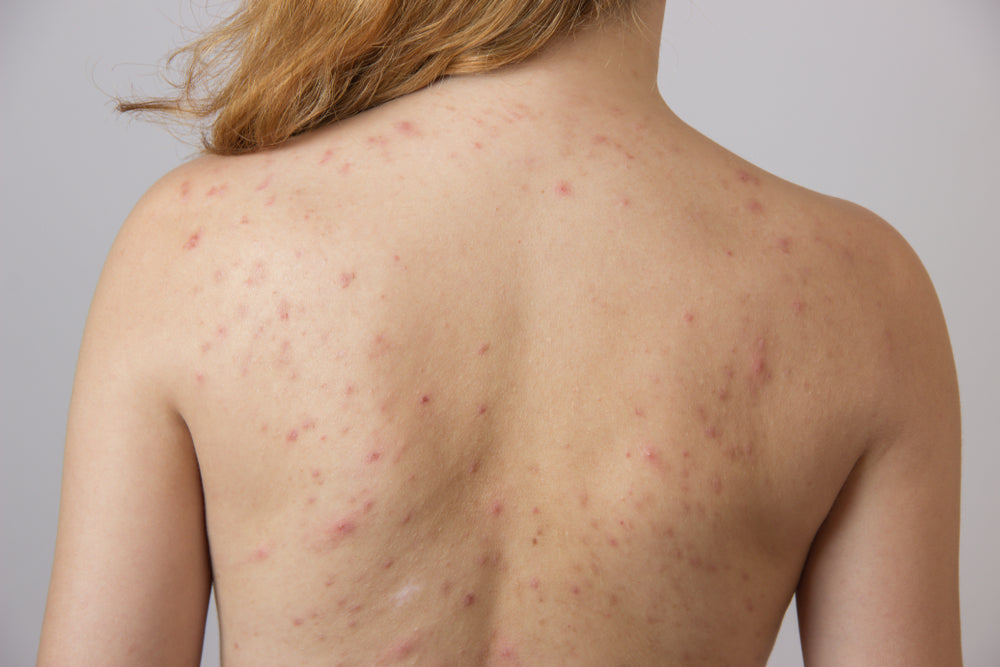Body acne, including acne on the back (“bacne”), chest, and shoulders can be more aggressive than face acne, however, the process of acne formation is the same. The pores become filled with excess sebum, dead skin cells, and dirt which clogs the skin’s pores and hosts bacteria, leading to pimples. Whitehead pimples form when the hair follicle wall swells out. Blackhead pimples form when the clogged pore gets exposed to air.
Many factors contribute to body acne including genetics, medications, sweat, stress, and hormonal changes during puberty, menstruation, and pregnancy. Dairy and foods high on the Glycemic Index can also trigger body acne. Adhering to a consistent acne treatment regimen and incorporating healthy lifestyle changes can help eliminate and prevent hormonal body acne.
Hormonal Causes of Body Acne
One of the main causes of body acne is the change and fluctuation in hormone levels. Androgens, such as testosterone, cause an increase in sebum production, cell activity, and bacteria resulting in acne. Testosterone is more prevalent during puberty when sebum levels spike, increasing skin oiliness. For women, hormonal changes relating to pregnancy and the menstrual cycle also play a role in acne formation. Additionally, the decrease in estrogen levels around menopause can also cause acne.
Read More: Hormonal Acne in Men is Different
At-Home Treatments for Body Acne
Topical treatments are effective for clearing mild body acne. Swap out your body wash or soap with a Benzoyl Peroxide wash to help reduce oil production and maintain clear skin. Dr. Zenovia’s 10% Benzoyl Peroxide Acne Cleanser gently yet effectively cleanses acne-prone skin. Cleansing the back should be the last step in your shower routine in order to remove excess shampoo or conditioner left on your skin.
After showering, use a chemical exfoliant to help promote the cellular renewal process, unclog the pores, and accelerate the removal of dead skin cells to clear acne and prevent scarring. Dr. Zenovia’s 10% Glycolic Acne Control Peel Pads combine medical-grade glycolic and salicylic acid for powerful results.
Lastly, apply Dr. Zenovia’s Aloe Vera Blemish Soothing Moisturizer to soothe the skin, lock in moisture, and reduce the appearance of redness. Moisturizers protect the skin barrier and contrary to popular belief should still be used on oily skin types. Just make sure the moisturizer you are using is oil-free and non-comedogenic, meaning it won’t clog the pores. Some parts of the back may be hard to reach, so do your best or ask your partner for help!
Read More: How to Get Rid of Hormonal Chin Acne
Lifestyle Changes to Clear Hormonal Body Acne
Making simple lifestyle changes can also help fight against hormonal breakouts on the back, shoulders, and chest.
- Shower right after a workout to prevent the build-up of sebum and bacteria.
- Sweat and dirt can get trapped in tight tops, so exercise in a loose shirt to help the skin breathe and fight against the formation of back acne.
- If you wear clothing that exposes the back, remember to apply a non-greasy, lightweight sunscreen with SPF 30+. Avoiding the sun is key to prevent hyperpigmentation and dark marks. UV exposure can worsen red marks and scars.
- If you tend to sweat in warmer weather, bring an extra spare top or bra with you.
- Eat whole nutrient-dense foods, and avoid inflammatory foods such as animal protein, dairy, and sugar.
- Avoid using harsh scrubs or loofahs in the shower.
- Avoid picking or scraping body pimples.
Related Article: How to Get Rid of Cystic Acne
Body Acne Scarring
If you are experiencing any indentations or keloid scarring on your body as a result of acne, consider seeing a board-certified dermatologist who can start you on oral medications to prevent further scarring. Your body can scar more easily than your face due to the anatomy of the skin. There are fewer appendageal structures in the skin on your body compared to your face. Remember, your scars can stay with you for a lifetime, but prevention for acne that leads to scarring is available. Starting acne treatment as soon as possible is paramount to prevent scarring.
Read More: Hormonal Jawline Acne
Note from Dr. Zenovia: These recommendations apply to mild to moderate body acne. For more severe acne caused by hormonal changes, discuss your options with a board-certified dermatologist. Prescription treatments such as Isotretinoin may help.
[slider collection="Acne" title="Shop Hormonal Acne Skin Care Treatments"]


